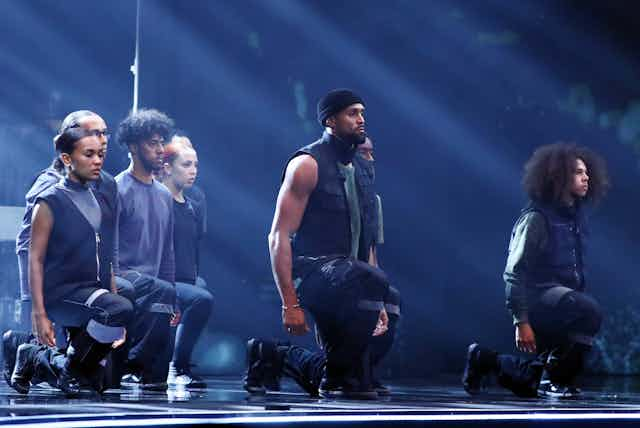After a Saturday night performance on ITV’s Britain’s Got Talent (BGT), Ofcom received more than 22,000 complaints and counting. This is its second-highest number of complaints about a TV show since 2010.
Was it nudity, violence, profanities or religious controversy that drew such outrage? No, it was a performance by the dance troupe Diversity that tackled racism and paid homage to the Black Lives Matter movement.
The performance contextualised COVID-19 and racism as two diseases inflicting British society. It restaged the images of a white policeman kneeling on the neck of a Black man in direct evocation of the arrest and killing of George Floyd in the US in May. The piece was powerful, emotive and performed with utter integrity and passion, concluding with an invocation of love as the fundamental answer to the ails of our time. In that sense, the piece was far from being problematic or radical in content.
Britain’s got racism
The apparent outrage by members of the public manifested in a deluge of complaints to Ofcom and a barrage of racial abuse and hate on social media directed at Diversity and its leader Ashley Banjo. Much of the abuse did not mask the inherent and violent racism that prompted it, as one comment cited by Banjo on his Instagram showed:
If you don’t like living in a white country go live in Africa. I think you would genuinely feel more comfortable there. As would I if you did.
Criticism of the performance, the choreography, and the Black Lives Matter movement was all, sadly, expected, but the worst of the social media backlash, according to Banjo, was something else:
No I don’t mean ‘criticism’… I mean ‘racism’. I mean hate… I mean the very thing that makes every single second of that performance and every single complaint worth it.
The incomprehensibly high number of complaints, though astonishing, speaks to Britain’s problematic conceptualisation of race and its relationship to racism. It shows a general intolerance to confront it. This, in part, is based on the denial of racism and a mythical idea of Britain as post-racial, where racism and racial inequality no longer exist. These, in turn, foster and allow white supremacy as a system of structural white dominance to go unchecked.

But, if anything, the backlash against Diversity “proves the large extent to which Britain’s got racism, rather than talent”, as the journalist Nicole Vassell wrote.
Consuming Black entertainment
Many complaints cited the political nature of the act; others the fact that BGT is a family show and therefore the wrong platform for the piece’s content. Both points are fundamentally flawed.
In its long run, BGT has had numerous political acts (from dramatising climate change to mocking former prime minister Theresa May). However, only Diversity’s was deemed too political and problematic.
The complaints point at a more sinister disbelief, and perhaps outrage, that this predominantly Black dance crew were granted access and ownership of their representation because therein lies power as the sociologist Stuart Hall explains:
[Power has to be understood] in broader cultural or symbolic terms, including the power to represent someone or something in a certain way - within a certain ‘regime of representation’. It includes the exercise of symbolic power through representational practices.
The complaints lead us to believe that political Black bodies and voices are deemed threatening and that Diversity is transgressing the limited and conditional space afforded to it. This is a subtle reminder to this predominantly Black dance troupe to “know your place” and “don’t be too big for your boots”. All is further evidence of the precarious, restricted and probationary access and representation of Black and ethnically diverse creatives in the cultural public space.
Blackness: consume, but don’t engage
Blackness is palatable when it is a form of entertainment, not when it seeks to teach or remind white people of racism. “Commodity seems to be the only way that audiences can engage with our unique voices”, writes arts journalist Erica Cardwell, and “when Black vulnerability incites fear: we must be destroyed”.
Popular culture is saturated with consuming Blackness as a “spice” or “seasoning” as bell hooks put it: “The commodification of Otherness has been so successful because it is offered as a new delight, more intense, more satisfying than normal ways of doing and feeling.”
The backlash against Diversity’s performance demonstrates that white audiences are content to consume Blackness, but unwilling to engage with the reality of being Black. As sociologist and race academic Remi Joseph-Salisbury wrote: “For many whites, wilful ignorance is far more comfortable than an anti-racist awakening.”

Choosing not to engage with politics is a political act. Political apathy is a privilege not many can afford. Therefore, choosing to complain about a piece that exposes racism could reasonably be construed as racist, because the complaint signifies complicity and abdication of responsibility. That a dance on racism could bother some so much to make a complaint means that they are too comfortable in racism operating unchecked and Black people dying so long as they don’t hear about it. This is complacency – and it is racism.
The complaints tell us, at best, about a culture of indifference, that grunts angrily when aroused; and at worst about racism and white supremacy, that contemptuously protest when it is reminded that Black Lives Matter.
It has to be said that this outrage was met with waves of support from powerful voices in the media and members of the public, with a petition demanding Ofcom drop the complaint reaching over 14,000 signatures.
It was also reported that Diversity is likely to star in a one-off BGT Christmas special. This is potentially good news if the intention is to widen the space for black-owned representation, to keep the conversation going, to educate and arouse anti-racist attitudes and actions. However, we should be vigilant that the momentum created by Diversity should not be co-opted, or commodified.

